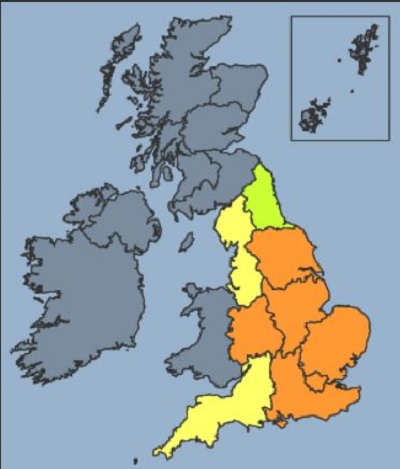With today and tomorrow forecast to be some of the hottest days of the year so far, NHS England is repeating its ‘heat-health’ warning to stay safe in heatwave conditions.
According to the MET Office website: “Very hot and humid weather is forecast to become established across much of England during Wednesday and Thursday, then continuing into Friday.”
 In more detail, it continues: “Whilst most areas will see a period of hot weather, the highest temperatures are expected across eastern parts. It will also be feeling humid, with temperatures remaining warm overnight. Temperatures are currently expected to peak across eastern parts on Friday, with the chance of some exceptionally hot weather developing.
In more detail, it continues: “Whilst most areas will see a period of hot weather, the highest temperatures are expected across eastern parts. It will also be feeling humid, with temperatures remaining warm overnight. Temperatures are currently expected to peak across eastern parts on Friday, with the chance of some exceptionally hot weather developing.
“However this is also likely to be lead to thunderstorms developing. At the same time less hot weather will spread east into western parts. The hot weather and thunderstorms are then expected to gradually clear east overnight into Saturday. During the weekend, slightly less hot weather will move across all parts of the UK, with temperatures likely falling below heat health thresholds.”
Pictured right is the MET Office map with the regions shade orange the ones covered by its ‘Heatwave Action’ warning. The action it advises is: “Stay out of the sun. Keep your home as cool as possible – shading windows and shutting them during the day may help. Open them when it is cooler at night. Keep drinking fluids. If there’s anybody you know, for example an older person living on their own, who might be at special risk, make sure they know what to do.”
More detailed health information is provided by the NHS, which advises that the main risks posed by a heatwave are dehydration, overheating (which can make symptoms worse for people who already have problems with their heart or breathing), and, in extreme cases, heat exhaustion and heatstroke. Those most at risk include:
- Older people, especially those over 75
- Babies and young children
- People with a serious chronic condition, especially heart or breathing problems
- People with mobility problems – for example, people with Parkinson’s disease or who have had a stroke
- People with serious mental health problems
- People on certain medications, including those that affect sweating and temperature control
- People who misuse alcohol or drugs
- People who are physically active – for example, labourers or those doing sports
If you are in an area affected by heatwave conditions, you should stay tuned to the radio or TV for the latest weather forecasts and if you’re planning to travel, check the forecast for your destination and along the route. You can find and download a ‘Beat the Heat’ checklist by clicking here, but general advice for coping in hot weather includes:
- Shut windows and pull down the shades when it is hotter outside. You can open the windows for ventilation when it is cooler.
- Avoid the heat: stay out of the sun and don’t go out between 11am and 3pm (the hottest part of the day) if you’re vulnerable to the effects of heat.
- Keep rooms cool by using shades or reflective material outside the windows. If this isn’t possible, use light-coloured curtains and keep them closed (metallic blinds and dark curtains can make the room hotter).
- Have cool baths or showers, and splash yourself with cool water.
- Drink cold drinks regularly, such as water and diluted fruit juice. Avoid excess alcohol, caffeine (tea, coffee and cola) or drinks high in sugar.
- Plan ahead to make sure you have enough supplies, such as food, water and any medications you need.
- Identify the coolest room in the house so you know where to go to keep cool.
- Wear loose, cool clothing, and a hat and sunglasses if you go outdoors.
- Check up on friends, relatives and neighbours who may be less able to look after themselves.
